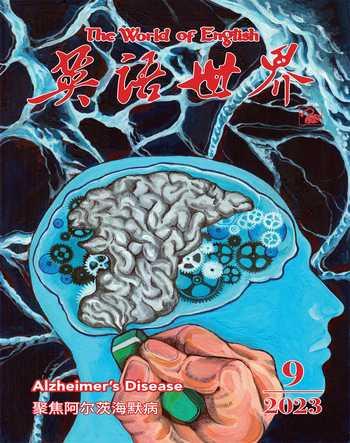Plastic Turnaround: Recycling Waste into Wonder Materials塑料的转机:变废为宝
罗宾·费伦 李敬文/译
Plastic recycling and pollution are two keystone problems facing society. Despite the popular belief that plastic wrapping or containers can be converted into useful products indefinitely, many can only be recycled once or not at all.
當今社会面临着塑料回收利用和塑料污染两项基本难题。尽管人们普遍认为,塑料包装和塑料容器可以无限期地转化为有用产品,但是许多塑料其实仅能再生一次,甚至根本不能再生。
Now a new generation of industrial technology offers to repurpose1 and recycle the millions of tons of plastic products and waste produced each year.
现在,新一代的工业技术可以改造、回收利用每年产生的几百万吨塑料产品和废料。
Chemically breaking it down
化学分解
Catalytic hydrothermal2 reactors can break down plastics into reusable chemicals and oils using heat, pressure, and the special properties of supercritical3 water, removing impurities and toxic byproducts. Another waste treatment technology creates a hot, fluid plastic mix that breaks down hard-to-recycle materials like cookie packets or food trays into oil for new plastics and fuel for power, making the entire system self-sustaining.
催化水热反应器可以利用热、压力,结合超临界水的特性,将塑料分解为可重复使用的化学品和石油,并分离出其中的杂质和有毒副产物。另一项废物处理技术将难以回收利用的材料,如饼干包装袋、食品托盘等,用制造出的高温流体塑料混合物分解转化为制造新塑料的石油和提供能源的燃料,让整个系统实现自给自足。
Chemicals companies have also invested in the circular economy and waste reduction. To tackle the fact that only 20% of the more than 400 million US tons of plastic produced each year is recycled, BASF4 has introduced chemical stabilizers to make recycled plastics more robust and created catalysts to obtain higher purity oils from waste plastic.
化工企业同样将资金投入到循环经济和废物减量中。美国每年生产的塑料超4亿吨,其中只有20%得到了回收利用。为了解决这一问题,巴斯夫公司开发出化学稳定剂,以增强再生塑料的强度,并且研制了催化剂,从废弃塑料中提炼出纯度更高的石油。
Government investment will be needed to make sure that innovation stays on track. The UKs Textiles Circularity Centre is one example thats built using a $7 million grant to transform the textile and clothing industries by turning waste materials into textiles, cutting down on imported materials and stopping waste going to landfill and incineration5.
要确保创新行之有道,就需要政府投资。英国的纺织品循环中心就是一个实例。建立该中心使用了700万美元的政府拨款,通过将废弃材料转化为纺织品、减少材料进口及不再对废弃物进行填埋或焚烧,推动纺织和服装业转型。
All of this comes at a time when the World Trade Organization (WTO) is looking to counter the massive increase of single use face masks and other plastic PPE6 caused by the coronavirus pandemic. Efforts to change the plastics and other extractive7 industries mindset from one of “take, make and dispose” to circular production is part of the WTOs sustainable development goals.
所有這一切发生时,正值新冠疫情导致一次性口罩和其他塑料防护用品的用量激增,世界贸易组织(WTO)在寻求问题的应对方法。努力使塑料和其他提炼行业转变观念,从“获取、制造、处理”转为循环生产,是WTO可持续发展目标的一部分。
Historical production
历史产量
Tackling that mindset is a historical necessity. Between 1950 and 2015 the volume of plastic manufactured equaled 8.7 billion tons—more than a ton for every person on Earth. But by 2050, the total mass of plastic waste is forecast to reach 13 billion tons. Gas and chemical emissions from production, landfill waste, plus the breakdown of microplastics into our water and food, create a toxic environment with a devastating effect on the planets health.
改变这种观念是历史的必然。1950年至2015年间,全球一共生产了87亿吨塑料,人均超过1吨。但到2050年,塑料废弃物的总量预计将达到130亿吨。在生产、废料填埋以及微塑料分解过程中排放的气体和化学物质,进入水和食物中,形成了有毒的环境,这对地球的健康有着毁灭性影响。
Up-cycling8 the future
未来改造利用
Providing hope for tackling the mountain of waste generated are researchers hoping to turn that plastic into wonder materials. Graphene is a simple one-atom-thick layer of carbon that has multiple uses from making lightweight flexible solar panels to developing new cancer treatments.
研究人员希望将废弃塑料转化为奇材,这有望解决堆积如山的废料。石墨烯是一种仅单原子厚度的碳层,却具有制作轻型柔性太阳能电池板、研发新的癌症疗法等多种用途。
Scientists at Rice University in Houston have created a method called flash joule9 conversion, which upcycles plastic waste to graphene using electric current. Even more promising is the fact that the graphene created is high quality, cheaper to produce, and with fewer defects than other ways of making graphene.
莱斯大学位于美国休斯顿,该大学的科学家提出了一种名为“闪速焦耳转化”的方法,利用电流将塑料垃圾转化为石墨烯。更令人看好的是,与其他制备方式相比,以这种方式制成的石墨烯质量很高、成本更低且缺陷更少。
Waste plastic can also be broken down into high value carbon nanotubes10 and clean hydrogen fuel in a matter of seconds using microwaves and cheap iron-based catalysts, another research team has discovered. Carbon nanotubes can then be used in water filters, as thin-film electronic coatings or in automotive parts, while hydrogen is used to fuel zero-emission vehicles, for energy storage and to heat buildings.
另一个科研团队发现,还可以利用微波和廉价的铁基催化剂,将废弃塑料在几秒内分解为高价值的碳纳米管和清洁的氢燃料。碳纳米管又可以用在水过滤器中、充当电子薄膜涂层或用于制作汽车零部件。氢则可以为零排放汽车提供燃料、用于储能或者建筑供暖。
“Our environment is being polluted by our consumption patterns,” says structural engineer Arthur Huang, creator of a mobile, solar-powered plastic upcycling plant called Trashpresso. His concept shreds waste polyethylene, polystyrene, and polypropylene and turning it into household items and plastic bricks. The way forward, he says, is to think like the Romans, who enthusiastically recycled materials to make their buildings.
“我们的环境正因为消费模式而受到污染。”结构工程师黄谦智说。他发明了移动式太阳能塑料改造利用装置“环生零耗机”,其理念是粉碎废弃的聚乙烯、聚苯乙烯和聚丙烯,将它们转化为家居用品和塑料地砖。“未来的方向,”他说,“是像罗马人一样思考,他们热衷于回收利用材料,用以建造房屋。”
These and other initiatives like the New Plastics Economy11 aim to transform our use of this handy material and to reduce the excess of plastic in our environment. Huang and his fellow innovators recognize that by making sure that plastic never becomes waste in the first place we can change the way we design and use it, so it is either reusable, recyclable, or compostable12.
诸如此类的倡议,例如“新塑料经济”,旨在转变这种便利材料的使用方式,减少环境中过量的塑料。黄谦智及其同伴认识到,首先确保塑料永远不会成为废料,就能改变设计和使用塑料的方式,让它得到重复使用、回收利用,或者将它制成堆肥。
(译者为“《英语世界》杯”翻译大赛获奖者)
1 repurpose(为适合新用途)对……稍加修改。 2 hydrothermal(与)热液(有关)的。 3 supercritical在临界以上的,超临界的。
4 德国化工企业,在全球化工企业50强中位列第一。 5 incineration焚烧。 6 = personal protective equipment个人防護用品。 7 extractive提取的,提炼的。
8 up-cycle改造利用,升级改造(创造性地再利用废料,使新材料具有更高的质量和环境保护价值)。 9 joule焦耳(能量或功的单位)。 10 nanotube纳米管。
11新塑料经济,首见于2016年达沃斯世界经济论坛,论坛提出建立塑料循环经济的愿景。 12 compostable可制成堆肥的。
- 英语世界的其它文章
- What Is Alzheimer’s Disease?何为阿尔茨海默病?
- The Facts About 6 Common Alzheimer’s Myths关于阿尔茨海默病常见的六种误解
- 7 Ways to Reduce Your Alzheimer’s Risk降低阿尔茨海默病患病风险的七因素
- Interacting with People with Alzheimer’s与阿尔茨海默病患者的相处之道
- When an Alzheimer’s Patient Says They Want to Go Home…当阿尔茨海默病患者说想回家时……
- 7 Films That Show the Truth About Living with Alzheimer’s揭示阿尔茨海默病患者真实生活的七佳片

